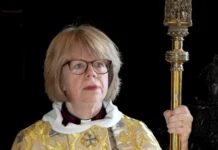The statement from the Council of General Synod was originally posted on March 13, and has been updated to include attachments on March 15 and March 23, 2022
During its March 10-13 meeting, the Council of the General Synod1 of the Anglican Church of Canada (CoGS) devoted several hours to intensive and extensive discussion of the matters raised in the open letter from #ACCtoo, with its three calls for action. The Council carefully considered how it should best respond, within the terms of its role and mandate, in a way that is positive, constructive and collegial. While the outcome was not unanimous, there was broad consensus among Council members around much of this statement.
In this season of Lent, we strive to follow more closely the way of Jesus, the way of the Cross, the way of repentance, the way of love. What happened in this case was gravely wrong. It also revealed deeper, systemic wrongs. As elected representatives from the Anglican Church across Canada, the members of the Council are determined to take action to right wrongs, when and where we can.
Our hearts break at the harm done to the individuals involved in this matter, and the likelihood that actions by the church have reopened old wounds. Our hearts break at the suffering undergone by so many victims of sexual misconduct within the church, both past and present. Their experiences are valid and real. Indeed, during the discussion, some members of our Council gave passionate witness to their own revictimization; we were profoundly moved by their testimony. We are truly sorry for these things, and we are fiercely resolved to do better in the future.
There are at least three distinct, though related, strands to this issue, which unfortunately have been blurred in some of the public discussion to date. One is the matter of journalistic policy and practice; in particular, the respective roles of journalists and management when the church is the subject of the story. A second is the question of how the church does, and should, deal with complaints of sexual misconduct, and give meaningful expression to its “Safe Church” commitments. A third is the challenge faced by church leadership at all levels, given both the Gospel imperative to care for the powerless and victimized, and their covenanted responsibility to the institution.
Before addressing these issues in detail, two important observations:
- With regard to the recent journalistic incident, it is clear that some recollections of the specific details differ among those most directly involved.The Council is not in a position to sort out or resolve these differences. It’s our understanding that everyone acted in good faith.
- With regard to the earlier complaints of sexual misconduct, nothing in this statement is intended to revisit or call into question previous proceedings, of which the Council has no direct knowledge.There is clearly much hurt. It is well known that events that reflect earlier experiences of powerlessness and loss of control often lead to further traumatization.2
Turning to specific matters of journalism and management, the following findings and recommendations have emerged.
- The Council of the General Synod asserts, as a matter of principle, that the Anglican Church needs and wants to nurture independent journalism of integrity in its print and digital publications.
- The Council is satisfied that there never was an intention to prevent the publication of the story, which was planned to be primarily about the shortcomings of the church’s handling of sexual misconduct complaints in general.The Primate strongly hopes that journalistic staff will return to that subject, and find a way to complete and publish a major investigative piece on it. CoGS endorses this step, and will be watching to see it carried out.
- An internal review process of journalistic governance policies and practices, related management processes and protocols, and necessary training has already been commissioned, and is ongoing.The review team, working with management, journalistic staff and the Editorial Board, is encouraged to redouble their efforts and bring forward concrete recommendations for action at the earliest opportunity. CoGS expects to receive regular updates on this work, including at its anticipated in-person meetings this coming fall and next spring.
- Management has expressed regret for one of the most egregious errors in this case, namely sharing the text of a story in advance with individuals or institutions in the church that are the subject of that story.A commitment has been made not to do this in the future – a commitment Council expects to be fulfilled.
- CoGS is assured that the written report of the independent investigator deals entirely with journalistic matters, and says absolutely nothing about the circumstances of the original complaints by the individuals. There may be valid reasons for not making that report publicly available in its entirety. However, the Council notes the Primate’s offer to meet with the three individuals, along with a mutually agreeable facilitator, to share the full report, with appropriate mutual assurances of privacy and confidentiality. CoGS also recommends that the full report be discussed with the members of the Editorial Board, to assist them in making future improvements. In addition, the Primate’s summary response to the report, which was shared with CoGS last November, should be made public.
Focussing now on the handling of complaints and accusations of sexual misconduct within the church, the Council is taking or recommending the following actions.
- The Council of the General Synod asserts, as a matter of principle, that anyone who interacts in any way with the Anglican Church of Canada – as an ordained or lay employee or volunteer, a worshipper or visitor, or in any other capacity – has the right to do so in an environment free from any form of sexual misconduct and sexual or gender-based violence. Individuals affected by sexual or gender-based violence or sexual misconduct must be supported through a clearly defined process.
- We commit ourselves, as the Council of the General Synod, to devote substantial attention over the next year to working on ways to improve and strengthen the General Synod’s policies and processes in this regard, and to do so from a perspective that, while consistent with civil law principles of natural justice and procedural fairness, is trauma-informed and victim-centred, rather than privileging and protecting the institution.CoGS recognizes that much good work has been, and is being, done across the country, on Safe Church policies and practices. But more remains to be done. We can learn from and exchange best practices. We can find ways to support complainants through what is often a complicated and frightening process. We must educate ourselves on victim-centered and trauma-informed approaches. The Council will be seeking clear, firm and concrete ways for the national church to work with provinces and dioceses to these ends. It is expected that individual CoGS members will also pursue them in their individual constituencies.
- At General Synod 2019, the Anglican Church of Canada committed itself to put into practice across the church The Anglican Communion Charter for the Safety of People and the Protocol for the Disclosure of Ministry Suitability Information between the Churches of the Anglican Communion; www.anglican.ca/faith/ministry/safe-church/Resolution A128, also adopted at General Synod 2019, directs CoGS to review its Safe Church policy base and report back to General Synod at its next session. This review process is underway, including reviewing the misconduct policy of General Synod to ensure it reflects the Safe Church Charter. With the gift of another year before General Synod, the Council recommits itself to this thorough review at the national level. Dioceses are encouraged to do the same, since it is primarily at the diocesan level that our adoption of best practices must happen.3
- Council has asked the Strategic Planning Working Group to incorporate this issue as a high priority in its future work on a new strategic plan for the General Synod.
Systemic and structural issues
- This incident has shown us, yet again, that our present practices can be inadequate when a complaint is brought against an institution or structure within our church.These situations are always challenging for all involved, and often can end up satisfying no one. Too often, the institution can become part of the mistreatment. One of our Marks of Mission is to seek to transform unjust structures. The Council commits to increased vigilance and affirmative ongoing action to address injustice in the structures, systems, policies and practices of the General Synod.
Reconciliation
- As the Council of the General Synod, we offer our sincere and unconditional apology for wrongs committed and harm done to the three individuals who were sources for the original story.In particular, we are deeply sorry that they have suffered further as a result of the way the story was handled. The Primate has already given her public apologies to them, and is prepared to restate those apologies in any form and forum that would be helpful. The General Secretary has also offered to make a full and sincere apology for harm done.
- The Primate has indicated her willingness to meet with the complainants, individually or collectively, at any time.We recognize that this may be difficult or impossible for them to do. However, the Primate has said that she would be willing to communicate through an intermediary, if that would be helpful to explore avenues of addressing their concerns and seeking reconciliation. Members of Council pray that these overtures may bear fruit, and/or that alternative pathways may be opened.
- At the same meeting where CoGS considered these matters and prepared this statement, we also heard from the Anglican Council of Indigenous Peoples and Sacred Circle about the Covenant and Way of Life for the self-determining Indigenous church.We celebrate these documents, and commend them to all Anglicans as a ray of hope for God’s church and God’s world. An important part of this process has been, and continues to be, the voice of survivors of abuse in residential schools and systemic racism within our church. We still have much to address in repentance and action towards reconciliation and the 94 Calls to Action. This also informs our commitment to a Safe Church.
CoGS asks that this statement, along with the summary response to the investigation report, and the apologies by the Primate and General Secretary, be published immediately and widely through Anglican Church of Canada communications channels.
In a spirit of reconciliation and transformation, this statement was created by the Council of the General Synod of the Anglican Church of Canada on March 11-13, 2022. The Council has identified much important work it needs to do. This will likely not be the last word on any of these matters. Please God it can be a constructive next step, paving the way for further concrete actions, continuous improvement, and respectful dialogue.
We are confident that all Anglicans are contributing, to the best of their ability, to build a better church. We welcome their gifts and contributions, and thank God for them. The members of CoGS ask your prayers that we might all find wisdom and healing through this process.
Signed on behalf of the Council of the General Synod by
The Rev. Dr. Karen Egan
Prolocutor
Ms. Judith Moses
Deputy Prolocutor
Attachments
- Summary Response to Report on Anglican Journal Investigation
- Letter from the Primate to the Signatories of the Open Letter to the Anglican Church of Canada
- Statement from the General Secretary
1The Council of the General Synod is the executive body of the General Synod of the Anglican Church of Canada. The bulk of its membership is made up of bishops, clergy and laity elected by the General Synod, on the nomination of the four ecclesiastical provinces. Collectively, the members and officers of the Council represent most of the thirty dioceses that make up the ACC.
2 Trauma – Informed Practice Guide, BC Provincial Mental Health, May, 2013, p. 13.
3 “In the Anglican Church of Canada, the jurisdiction and authority for the development of conduct policies belongs to dioceses. The role of the General Synod with respect to this area of work is two-fold: to ensure that its own policy base is in harmony with the Charter, and to encourage dioceses in the development of their own policies and practices by promoting helpful resources.”
Implementing the Anglican Communion Safe Church Charter In the Anglican Church of Canada: A Guide for Review of Policy and Practice, p. 2



